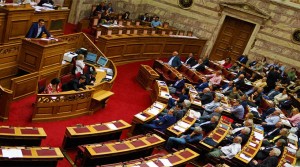The political gridlock over the formation of the new National Council for Radio and Television (NCRTV) will be transferred to a plenary session of the Greek parliament, Thursday, where the Greek government will be presenting an new amendment suspending article 2A of the previous TV law, which was ruled unconstitutional by the county’s supreme administrative court, the Council of State (CoS).
The Greek government, which suffered a setback to its plans to control the media landscape, is attempting to limit the scope of the changes on the article by including minor amendments that would effectively prevent the complete transfer of powers back the NCRTV, in an effort to send a message of consent to the opposing political parties on reaching agreement on the formation of the new media watchdog. After coming under fire over the TV law, authored by Minister of State Nikos Pappas, and the CoS ruling, the government wants to put the pressure on major opposition party New Democracy (ND), by demonstrating a consensual face and presenting ND as intransigent.
On its part, conservative major opposition party of New Democracy has made it clear that it would only consent to the formation of the new NCRTV, after 5 failed attempts by the parliamentary Council of Presidents’ Committee, under the condition of the complete scrapping of the Pappas TV law in its entirety, and not by its temporary suspension, as the government’s proposed amendment provides. ND wants the total abolition of the Pappas law, the submission of a new draft bill that regulates all media matters based on the recent ruling by the CoS, which would transfer all powers back to the NCRTV, including the number of TV licenses auctioned off, as well as the appointing commonly accepted persons on the media watchdog’s board. ND officials also point out that Nikos Pappas has lost all personal credibility and his insistence on retaining the right to decide on the number of TV licenses is undermining any efforts to reach common grounds between the parties.
Ask me anything
Explore related questions





